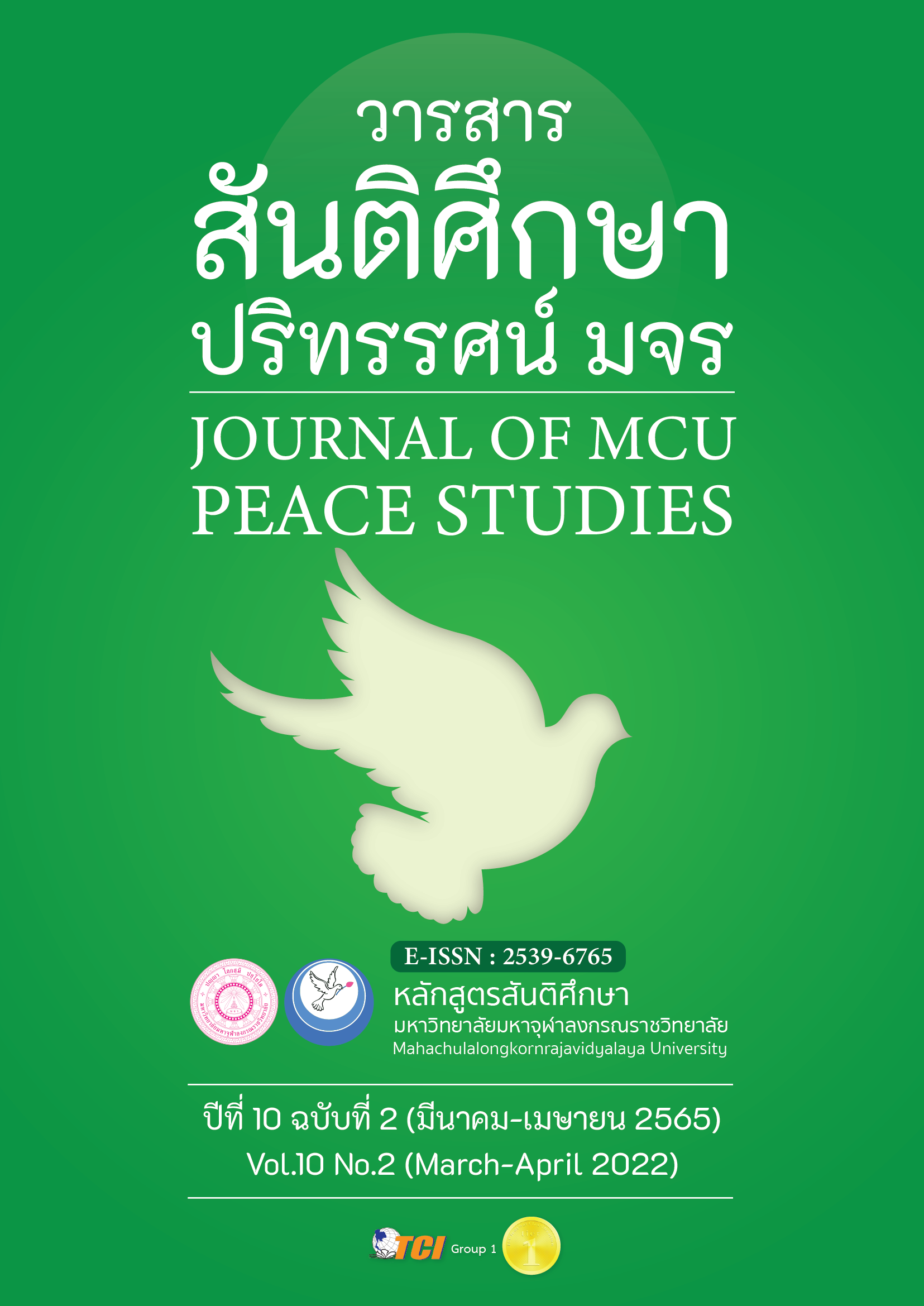การวิจัยและพัฒนาทักษะนวัตกรรม ของเยาวชนไทยสำหรับรองรับการประกอบอาชีพในโลกอนาคต
Main Article Content
บทคัดย่อ
บทความวิจัยนี้ มีวัตถุประสงค์งานวิจัยเพื่อ 1) พัฒนารูปแบบการเรียนการสอนส่งเสริมทักษะนวัตกรรมของเยาวชนสำหรับรองรับการประกอบอาชีพในโลกอนาคต 2) เพื่อพัฒนาทักษะนวัตกรรมของเยาวชนไทย 3) เพื่อศึกษาผลการใช้รูปแบบการเรียนการสอนส่งเสริมทักษะนวัตกรรมของเยาวชนไทยสำหรับรองรับการประกอบอาชีพในโลกอนาคต โดยใช้กระบวนการวิจัยและพัฒนา 4 ระยะ ได้แก่ ระยะที่ 1 ศึกษาข้อมูลพื้นฐานและความจำเป็น ระยะที่ 2 พัฒนารูปแบบ ระยะที่ 3 ทดลองใช้รูปแบบ ระยะ 4 ศึกษาผลการใช้และปรับปรุงรูปแบบ กลุ่มเป้าหมายมี 3 กลุ่ม ได้แก่ กลุ่มเยาวชนที่จะประกอบอาชีพด้านการศึกษาในอนาคต กลุ่มเยาวชนที่จะประกอบอาชีพด้านเกษตรกรรมในอนาคต และกลุ่มเยาวชนที่จะประกอบอาชีพด้านการประกอบการในอนาคต รวมจำนวน 150 คน ซึ่งได้มาโดยการการเลือกแบบเจาะจง เครื่องมือที่ใช้ในการเก็บรวบรวมข้อมูลได้แก่ แผนการจัดการเรียนรู้ แบบสังเกตพฤติกรรม แบบสัมภาษณ์ แบบสอบถาม และ แบบบันทึกภาคสนาม วิเคราะห์ข้อมูลโดยใช้สถิติพื้นฐาน ได้แก่ ค่าความถี่ ร้อยละ ค่าเฉลี่ย ส่วนเบี่ยงเบนมาตรฐาน และใช้สถิติทดสอบพาราเมตริก ได้แก่ การทดสอบค่าที
ผลการวิจัยพบว่า 1) ผลการพัฒนารูปแบบการเรียนการสอนส่งเสริมทักษะนวัตกรรมของเยาวชนสำหรับรองรับการประกอบอาชีพในโลกอนาคต มี 6 องค์ประกอบ ได้แก่ (1) หลักการแนวคิดและทฤษฎีพื้นฐาน (2) วัตถุประสงค์ (3) ขั้นตอนการเรียนรู้ (4) ระบบสังคม (5) หลักการตอบสนอง และ (6) ระบบสนับสนุน ผลการประเมินความเหมาะสมของรูปแบบพบว่ามีความเหมาะสมของรูปแบบโดยรวมอยู่ในระดับมาก 2) เยาวชนไทยที่เรียนโดยใช้รูปแบบการเรียนการสอนส่งเสริมทักษะนวัตกรรมของเยาวชนสำหรับรองรับการประกอบอาชีพในโลกอนาคต มีทักษะนวัตกรรมหลังเรียนสูงกว่าก่อนเรียนอย่างมีนัยสำคัญทางสถิติที่ระดับ .05 และ 3) ผลการศึกษาการใช้รูปแบบพบว่า เยาวชนไทยมีทักษะนวัตกรรมอยู่ในระดับสูง เมื่อพิจารณารายกลุ่มย่อยพบว่า เยาวชนที่ประกอบอาชีพด้านการประกอบการในอนาคตมีทักษะนวัตกรรมสูงที่สุด รองลงมาคือเยาวชนที่ประกอบอาชีพด้านการศึกษาในอนาคต และเยาวชนที่ประกอบอาชีพด้านเกษตรกรรมในอนาคตต่ำที่สุด นอกจากนี้พบว่าหากจะนำรูปแบบที่พัฒนาขึ้นไปใช้กับกลุ่มเป้าหมายแต่ละกลุ่ม ผู้สอนควรออกแบบกิจกรรมและสร้างแรงบันดาลใจให้มีความเหมาะสมกับเยาวชนแต่ละกลุ่ม
Article Details

อนุญาตภายใต้เงื่อนไข Creative Commons Attribution-NonCommercial-NoDerivatives 4.0 International License.
ทัศนะและความคิดเห็นที่ปรากฏในบทความในวารสาร ถือเป็นความรับผิดชอบของผู้เขียนบทความนั้น และไม่ถือเป็นทัศนะและความรับผิดชอบของกองบรรณาธิการ ยินยอมว่าบทความเป็นลิขสิทธิ์ของวารสาร
เอกสารอ้างอิง
Amelink, C., Fowlin, J., & Scales, G. (2013). Defining and Measuring Innovative Thinking Among Engineering Undergraduates. 120th ASEE Annual Conference and Exposition, June 22-23 (1-5). Atlanta: American Society for Engineering Education.
Anderson, L.W. (2001). A Taxonomy for Learning Teaching, and Assessing: A Revision of Bloom's Taxonomy of Education Objectivcs. New York: Addison Wesley Longman.
Andrews, J., & Clark, R. (2018). Engaging with Heritage to Promote Innovative Thinking in Engineering Management Education. Retrieved May 3, 2021, from https://www.researchgate.net/publication/328557445_Engaging_with_Heritage_to_Promote_Innovative_Thinking_in_Engineering_Management_Education
Bender, W. N. (2012). Project-based learning: Differentiating instruction for the 21st century. United States: Corwin.
Buason, R. (2013). Qualitative research of education. Bangkok: V. PRINT (1991) COMPANY LIMITED.
Chimphali, K. (2016). Development of Instructional Model to Promote Understanding of Nature of Science for High School Students. (Doctoral Dissertation). Mahasarakham University. Maha Sarakham.
Drapeau, P. (2014). Sparking student creativity: Practical ways to promote innovative thinking and problem solving. Virginia USA: ASCD.
Garrison, D. R. (1993). A cognitive constructivist view of distance education: An analysis of teaching learning assumptions. Distance education, 14(2), 199-211.
Hart, S. (2013). Thinking through teaching: A framework for enhancing participation and learning. New York: Routledge.
Joyce, B., Weil, M., & Calhoun, E. (2011). Models of Teaching. (8th ed.). Boston: Pearson Education.
Keeves, J.P. (1997). Educational Research Methodology and Measurement. An International Handbook. Oxford: Pergamon Press.
Lee, C., & Benza, R. (2015). Teaching Innovation Skills: Application of Design Thinking in a Graduate Marketing Course. Business Education Innovation Journal, 7(1), 43-50.
Morad, S., Ragonis, N., & Barak, M. (2014). Innovative Thinking and ICT Expertise of Undergraduate Students in Education. In Eshet-Alkalai, Y. et al. (Eds.), Learning in the Technological Era: Proceedings of the 9th Chais Conferencefor the Study of Innovation and Learning Technologies (112-120). Israel: The Open University of Isreal.
Mugione, F., & Penaluna, A. (2018). Developing and Evaluating Enhanced Innovative Thinking Skills in Learners. In Entrepreneurial Learning City Regions (pp. 101-120). Springer: Berlin/Heidelberg, Germany.
Nakin, S. (2016). The development of Learning Management Model to Enhance Ethics for Preservice teachers: Case study of Nakhonratchasima Rajabhat University. (Doctoral Dissertation). Mahasarakham University. Maha Sarakham.
Nussbaum-Beach, S., & Hall, L. R. (2012). The connected educator: Learning and leading in a digital age. Unite States: Solution Tree Press.
Office of the Higher Education Commission. (2006.) National Qualifications Framework for Higher Education in Thailand Implementation Handbook. Bangkok: National Statistical Office.
Orlandi, A. E. C. (2010). Experimental experience in design education as a resource for innovative thinking: The case of Bruno Munari. Procedia-Social and Behavioral Sciences, 2(2), 5039-504.
Pharanat, W. (2014). Development of Science Instructional to Promote Reasoned Argumentation. (Doctoral Dissertation). Mahasarakham University. Maha Sarakham.
Phusee-orn, S. (2011). Application of SPSS in Research Data Analysis, (5th ed.). Mahasarakam: Mahasarakam University.
Roi Et Provincial Office. (2008). Roi Et Provincial Development Plan 2018-2021. Roi Et: Roi Et Provincial Office.
Shekar, A. (2013). Teaching innovative thinking and consumer-oriented design to engineering students: perspectives based on observations and experience. International Journal of Mechanical Engineering Education, 41(1), 14-16.
Wu, C. H., Hwang, G. J., Kuo, F. R., & Huang, I. (2013). A mindtool-based collaborative learning approach to enhancing students' innovative performance in management courses. Australasian Journal of Educational Technology, 29(1), 128-142.


